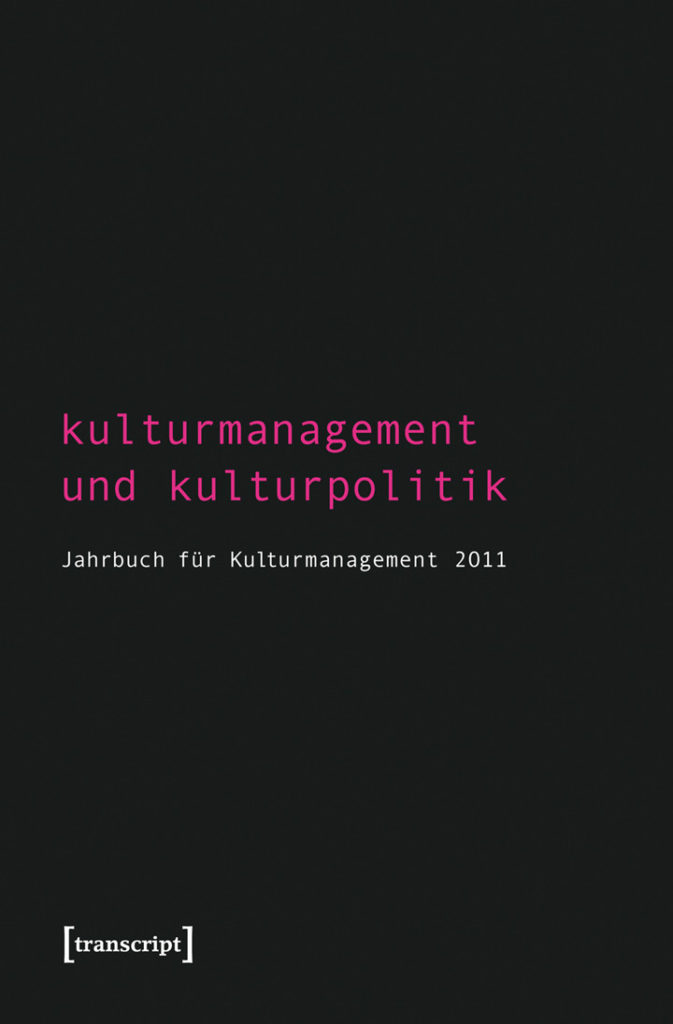Research Article
Zwischen Management und Governance
Braucht Kulturmanagement eine Reflexionstheorie?
Abstract
Culture management is primarily a practical affair that needs appropriate management skills and competencies. It is argued that culture management moreover needs a properly reflexive theory of cultural processes, and more specifically, cultural processes in the various domains of the arts. Such a theory must go far beyond what usually passes as “management theory” since it has to deal with the complex logic of cultural objects, activities, practices, persons, incentives and constraints. In particular, culture managers would benefit (it is argued) from the social theory of the professions and of professionalisation. Cultural managers can strife for genuine professionalisation, on the model of other genuine professionals like doctors or lawyers, if they understand the basic challenge in their job as trying to help to sustain the intrinsic rationality of the primary cultural practice that they care for as managers vis-a-vis other determinate rationalities embodied in other social systems, fields, and actors, e.g. economic and political rationalities. The core normative purpose of culture management, on this view, is the reconciliation of various rationalities that compete but whose joint synergies are needed in order to promote as much and as good as possible the rationality of the particular cultural practice (e.g., an opera house, a theater, a cinema) for which the cultural manager has been trusted with a mandate.
Keywords
2011
Kulturmanagement und Kulturpolitik

Related Articles
Yearbook for Culture Management
Essay
Journal of Cultural Management 2016 (1)
Research Article
Journal of Cultural Management 2017 (2)
Case Study
Klaus von BEYME: Kulturpolitik in Deutschland. Von der Staatsförderung zur Kreativwirtschaft
Journal of Cultural Management 2015 (1)
Book Review
Journal of Cultural Management 2018 (2)
Research Article
Yearbook for Culture Management 2013
Research Article
© 2025, Journal of Cultural Management and Cultural Policy
Keywords
- Aesthetics
- Higher Education
- Cultural Diplomacy and Foreign Cultural Policy
- Occupation
- Career and Professional Role
- Audience Development
- Audience Studies and Visitor Studies
- Visitor Motivations
- Business
- Covid Pandemic
- Democracy
- Digitalization
- Diversity
- Third Sector
- Empirical Aesthetics
- Development
- Ethics
- Evaluation
- Field Theory
- Festival
- Film
- Federalism
- Community Arts
- Societal Change
- Ideology
- Staging
- Career
- Communication
- Concert
- Creative Industries
- Creativity
- Crisis
- Culture
- arts organizations, cultural organizations
- Cultural Participation
- Cultural Change
- Fincancing The Arts
- Cultural Promotion Law
- Cultural History
- Cultural Management
- Cultural Economy
- Cultural Organizations
- Art Education
- Cultural Policy
- Cultural Production
- Cultural Sociology
- Art Education
- Cultural Understanding
- Arts Administration
- Cultural Industry
- Cultural Sciences
- Art
- Art Field
- Arts Research
- Artists
- Artistic Research
- Artistic Reputation
- Arts Management
- Arts Organizations
- Art education
- Arts Marketing
- Arts Administration
- Curating
- Leadership
- Literature
- Advocacy
- Management
- Marketing
- Market
- Media
- Methods Development
- Mexico
- Monumentalizing
- Museum
- Music
- Non-Visitor Studies
- Opera
- Orchestra
- Organization
- Political Expression
- Post-truth Politics
- Professional Role
- Audience
- Audience Development
- Law
- Government
- Role
- Socially Engaged Art
- Social Cohesion
- Social Change
- Social Cohesion
- Non-visitor Socio-demographics
- Socioculture
- State
- Symbolic capital
- Dance
- Participatory Justice
- Theatre
- Theatre Governance
- Theory Development
- Tourism
- Transformation
- Survey
- Entrepreneurship
- Urbanism
- Civil Society


